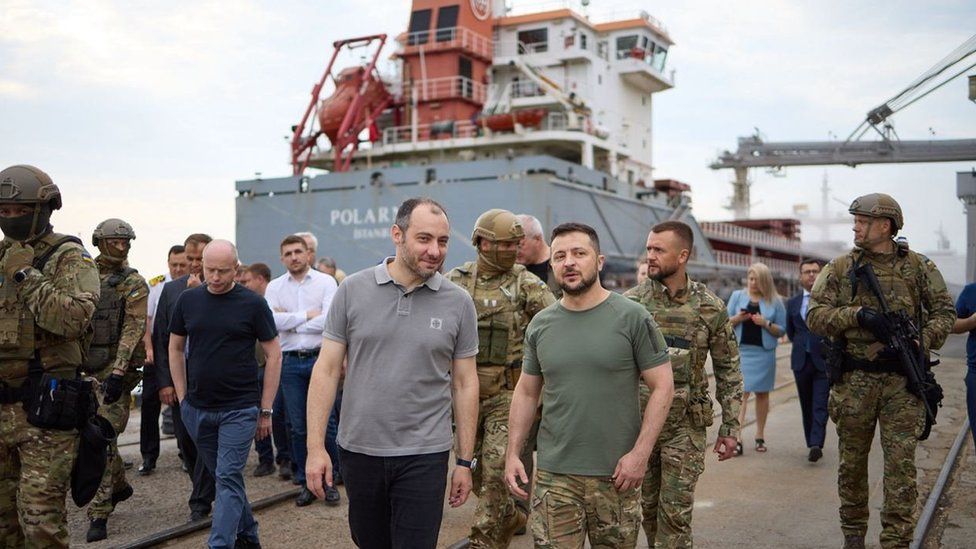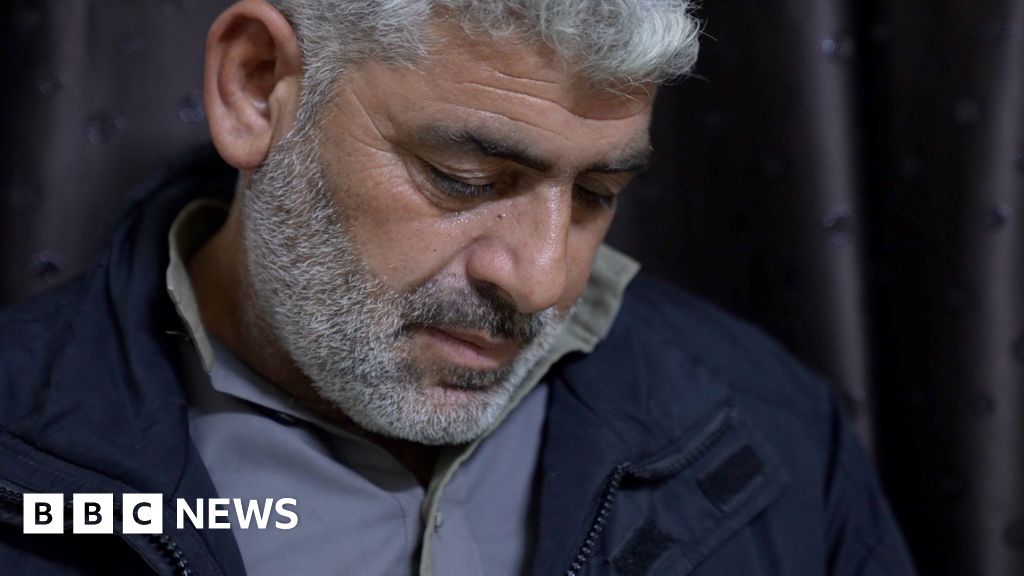ARTICLE AD BOX
 Image source, Telegram/Zelensky
Image source, Telegram/Zelensky
President Zelensky made an unannounced appearance in Odesa amid optimism about the first shipment
The first grain ship from Ukraine since Russia's invasion could leave port as early as Friday, but "crucial details" are still being ironed out, says UN aid chief Martin Griffiths.
A UN-led deal was signed a week ago to resume exports after a blockage which led to food price rises.
With hopes of an imminent departure, President Volodymyr Zelensky arrived in Odesa saying Ukraine was ready.
A source told Russian media it could happen, barring unforeseen events.
The focus on Friday was on the port of Chornomorsk, where a ship loaded with grain was being readied to leave. However, the UN aid chief said that could only happen safely when the route through the Black Sea was finalised.
Under the agreement signed by Russia and Ukraine, the sea corridor, convoy and inspection of the cargo are all being organised by a joint co-ordination centre (JCC) in Turkey and final preparations were reportedly still not in place.
Waiting for departure
By James Waterhouse, Ukraine correspondent in Chornomorsk
While significant, the first grain ship to leave Ukraine's shores will be more of a testing of the waters than an unblocking of a major supply route.
From our vantage point next to the port of Chornomorsk, south of Odesa, the Black Sea is looking pretty choppy.
It's here that there has been the first shipping activity in weeks, with tugboats manoeuvring and a single vessel changing position.
Image source, Twitter/@MelSimmonsFCDO
Image caption,UK ambassador Melinda Simmons (fourth from L) posted a picture of the G7 envoys at the port of Odesa
The gathering of G7 and United Nations ambassadors 25 miles to the north reflects the political will to finally export Ukraine's grain again.
But by the admission of global shipping insurers and even the UN itself, there are still "crucial" details to be ironed out.
Don't expect convoys of grain to immediately follow the first ship, if or when it leaves.
Russian naval forces control most of the Black Sea, leaving some 20 million tonnes of grain stuck in Ukraine's Black Sea ports for almost six months. An added risk to the operation is that the biggest port of Odesa has been mined by Ukraine's military.
The suspension of grain exports, now into a sixth month, has led to food shortages across Africa. The destination of the first ship was not yet clear but the UN aid chief said Somalia was a priority. Eight areas of the country are at risk of famine.
President Zelensky said it was important for Ukraine to guarantee global food security: "While someone, blocking the Black Sea, takes the lives of other countries, we are giving them opportunity to survive."
Although Russia fired missiles at Odesa port at the weekend, there is optimism that the deal, set for an initial 120 days, may work. Before Russia's invasion, the two countries accounted for a third of the world's exports of wheat and barley. Russia is also keen to resume its own exports of grain and fertiliser.
Foreign Minister Dmytro Kuleba said Kyiv would do everything in its power to make the route work: "To organise and implement this first passage through the humanitarian corridor, all the details are calculated, everything is checked once more, twice, three times."
"There are, as you know, ships with grain in those Odesa ports ready to leave, and we have been hoping to see that happen even today or tomorrow," Martin Griffiths told reporters late on Thursday. "But we can only see that happen safely when those procedures are clear and the parties in the JCC have agreed to those movements and where exactly is the corridor."
The regional head in Odesa, Serhiy Bratchuk, posted a map showing how the grain corridor to and from Odesa might work, with an area for inspection near the port and a route following the Ukrainian coast to the mouth of the River Danube.
Mr Griffiths said he thought any problems would be settled very quickly with the aim of returning to pre-war export levels of some five million metric tonnes a month.

 2 years ago
18
2 years ago
18








 English (US) ·
English (US) ·